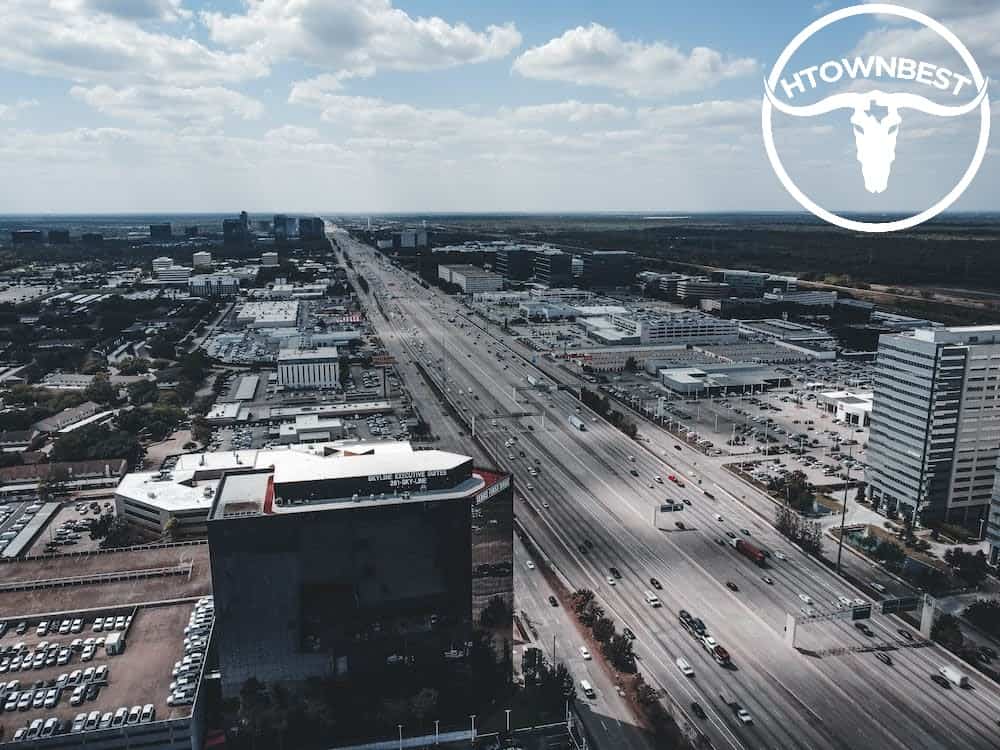H-Town Hiccups: A Candid Guide to Houston’s Cons

- There are no zoning laws.
- Public transportation is lacking.
- There are cars everywhere.
- The roads are terrible.
- The heat gets real and overwhelming.
- There’s always a threat of a storm.
- There are a lot of homeless people.
- Incidents of crime are high and on the rise.
- Bugs and pests share the space with residents.
- Property tax is high.
- The city doesn’t recycle as much.
Welcome to the flip side of Houston, where we peel back the layers of this vibrant city to reveal its quirks, challenges, and unexpected pitfalls.
Buckle up as we embark on a journey beyond the glossy brochures and postcards, exploring the untold tales that make Houston, well, not your average paradise. From sweltering heat waves to labyrinthine roads.
We’re shedding light on the less-than-stellar aspects that often go unnoticed. Get ready for a rollercoaster ride through the underbelly of H-Town – it’s time to uncover the real, unfiltered Houston experience!
There are no zoning laws.

Image Source: Kinder Institute for Urban Research – Rice University Official Website
One of the distinct characteristics that sets Houston apart is its lack of zoning laws, making it the only major U.S. city without such regulations.
This unique approach, or lack thereof, allows for a seemingly haphazard mix of structures reminiscent of third-world countries.
In Houston, the absence of zoning laws means that construction can happen virtually anywhere, leading to an eclectic mix of neighborhoods with little distinct character.
It’s not uncommon to find a parking garage next to a residential home, and the scarcity of sidewalks contributes to a less pedestrian-friendly environment.
The city’s varied downtowns scattered across different areas add to the eclectic, yet somewhat disorganized, urban landscape.
Public transportation is lacking.

Image Source: Kinder Institute for Urban Research – Rice University Official Website
While Houston boasts a reputation as one of the largest cities in the United States, its public transportation system falls short in meeting the needs of its residents.
The city’s layout, coupled with the absence of elevated or underground rail systems, makes it one of the most unwalkable metropolises.
The limited coverage of the bus system and the relatively short stretch of the light rail further compound transportation challenges, leaving many residents heavily dependent on personal vehicles.
Traffic congestion, with the average commute taking about 30 minutes, adds to the city’s transportation woes.
If you’re considering a move to Houston or just visiting, we suggest you carefully evaluate your transportation options to ensure a seamless urban experience.
There are cars everywhere.

Image Source: The Business Journals Official Website
Houston’s vibrant atmosphere comes at a cost, and one of the most apparent drawbacks is its notorious traffic congestion.
The city’s bustling roads during rush hours can turn commuting into a daunting task, even with the prevalence of rideshare services like Uber and Lyft.
The perpetual influx of vehicles contributes not only to traffic jams but also to air pollution. As the fourth-largest city in the U.S. Houston’s roadways are teeming with cars, adversely affecting the air quality.
The combination of industrial buildings and congested traffic exacerbates pollution concerns, posing a significant downside for residents concerned about environmental quality.
The roads are terrible.

Image Source: Texas Department of Transportation Official Website
For many Houstonians, navigating the city means encountering potholes and rough roads as an inevitable part of the journey. Approximately 28.6% of Houston’s roads are classified as being in poor condition, surpassing the national average of 26.4%.
This statistic positions Houston at number 22 on the list of urban areas with the worst roads in the country. Pothole-ridden streets are a common sight, and the city’s struggle to maintain road quality adds an additional layer of inconvenience for residents.
The bumpy rides and road conditions present an ongoing challenge for those navigating the extensive network of streets in this sprawling metropolis. Not to mention, the routine car maintenance you have to pay for from the damage caused by the bad roads.
Here are some of the worst roads in the city:
- Briar Forest and Wilcrest
- Bissonnet
- Cullen Boulevard
- Kirkwood Road
- Pin Oak
- Richmond Avenue
- TC Jester
- Westheimer
The heat gets real and overwhelming.

Image Source: National Weather Service Official Website
Houston, renowned for its scorching summers, becomes a literal inferno during the peak of the season. The temperatures soar into the triple digits, with the mercury hitting nearly 109 degrees Fahrenheit in the blistering summer of 2011 and 2000.
The humidity, akin to stepping into a sauna with clothes on, creates an atmosphere that can be suffocating, like being draped in a wet, smelly blanket.
Venturing outdoors becomes an unappealing prospect, and residents often find solace indoors during these extreme weather episodes. So, you can imagine the electric bills during the summer when the heat hits its peak.
The stifling heat not only alters daily routines but also limits outdoor activities, transforming Houston into a city where outdoor excursions are often dictated by the relentless summer heat.
There’s always a threat of a storm.

Image Source: New York Times Official Website
Houston, perched on the Gulf of Mexico, contends with a constant threat of storms, ranging from typhoons to tropical storms. Strong winds from the Gulf stir heavy rains, resulting in widespread flooding across city streets.
This unpredictability in weather patterns poses challenges for residents, impacting their ability to plan outdoor activities and necessitating cautious travel during severe storms.
The ever-looming threat of extreme weather serves as a constant backdrop to life in Houston, influencing the city’s rhythm and residents’ daily plans.
More than that, the damage that these storms cost is no joke. From Hurricane Harvey in 2017, to the more recent Tropical Storm Imelda, around 1,700 homes get damaged in each storm, with damages amounting close to $8 billion.
Although the city has taken steps in trying to mitigate the effects, there really is no way to prevent the storms from happening.
There are a lot of homeless people.

Image Source: Houston Public Media Official Website
Addressing a societal challenge, Houston contends with a significant homeless population. According to data from the 2014 Houston Homeless Count, approximately 5,351 individuals experience homelessness on any given night.
This figure, based on the U.S. The Department of Housing and Urban Development‘s definition encompasses 2,291 people living unsheltered and 3,060 in sheltered facilities.
It’s crucial to note that this number reflects a 37% reduction from 2011, indicating ongoing efforts to address homelessness in the city.
However, the visible presence of homeless individuals remains a stark reality in certain areas, underscoring the complex social issues that cities like Houston confront.
Incidents of crime are high and on the rise.

Image Source: Greater Houston Partnership Official Website
Houston’s crime statistics place it prominently on lists of the most dangerous cities in America, and this reputation is not without reason.
While certain neighborhoods boast lower crime rates, others exhibit alarming figures, demanding heightened safety measures. Houston ranks 9th in the US cities with the highest homicide rates.
The influx of residents from crime-ridden cities and countries amplifies the challenges, attracting predatory individuals to areas teeming with newcomers.
A thriving drug trade further complicates the city’s security landscape, contributing to crime rates that residents grapple with on a daily basis.
The city’s vast surface area and multiple freeways pose logistical challenges for law enforcement, making it challenging to patrol effectively and allowing criminals to vanish from crime scenes rapidly.
With police vacancies outnumbering other cities, the shortage of law enforcement personnel exacerbates the situation, underscoring the multifaceted issues that contribute to Houston’s crime challenges.
Bugs and pests share the space with residents.

Image Source: Natran Green Pest Control Website
Houston, notorious for its stifling heat and humidity, grapples with an additional woe—the pervasive presence of pests. Ranking 5th in cities with the highest number of mosquitoes, Houston provides an ideal breeding ground for these pesky insects.
The city’s hot and humid summers create an environment conducive to mosquitoes, and residents often find themselves battling against these aggressive and prolific pests.
Cockroach infestations plague approximately one-third of households, earning Houston the unenviable title of the second-worst city for bug problems in the country.
Other bugs that plague the city include spiders, ants, and termites. As a result, the aroma of citronella candles and bug spray becomes a familiar scent, as residents strive to ward off the persistent mosquito population.
Living in Houston means cohabiting with these tenacious bugs, making pest control an ongoing challenge for its residents.
Property tax is high.

Image Source: Nataliya Vaitkevich on Pexels
One glaring drawback for residents in Houston is the burden of high property taxes, a reality shaped by a combination of factors unique to Texas.
The absence of personal income tax in the state places a heavy reliance on property taxes as a primary source of funding for essential public services such as schools, police, and fire departments.
Local taxing authorities set their property tax rates, resulting in a wide disparity across the state. Appraisal values on real estate consistently climb, further elevating the tax burden for homeowners.
Compared to the national average property tax rate, which typically ranges from 1.08% to 1.21%, Texas stands out with an average effective property tax rate exceeding 1.83%.
Harris County, encompassing Houston, bears the brunt with the fifth-highest property tax rates in Texas, averaging 2.09%.
The city doesn’t recycle as much.

Image Source: The New York Times Official Website
While recycling habits may not be a top concern for everyone, Houston’s poor recycling practices present a notable inconvenience for those accustomed to more robust recycling programs.
In comparison to regions where recycling is considered a sport, Houston’s recycling efforts fall significantly short, with only 19% of waste being recycled which falls 15% short from the national average of 34.7% according to the Environment America Org.
For residents who grew up in areas where recycling was a norm, the lack of a robust system in Houston can be a considerable hassle. The effort required to recycle, including driving to specific sites, adds an extra weekly errand to the to-do list.





